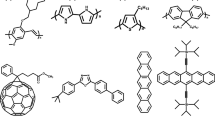
Overview
- Illustrates the principle and applications of devices/system
- Introduces recent developments of various organic devices
- Provides a concise and valuable guide to organic electronic devices
Access this book
Tax calculation will be finalised at checkout
Other ways to access
About this book
Similar content being viewed by others
Keywords
Table of contents (11 chapters)
-
Front Matter
Authors and Affiliations
About the authors
Dr. Chen**e obtained his bachelor and master degrees from Tian** University and Nanchang University, respectively. In 2020, he received his Ph.D. degree in Material Science from University of Erlangen-Nuremberg, Germany. Since Sep. 2020, he has become a research scientist in College of New Materials and New Energies, Shenzhen Technology University, China. During his Ph.D., he focused on researches of organic semiconductor nanoparticles and their applications on organic and perovskite solar cells. His recent research interest includes processing technology and morphology engineering in organic solar cells, light emitting diodes, thin-film transistors, and other organic electronics; the application of organic semiconductor nanoparticles in organic electronics and water splitting.
Dr. Peng You received his B.S. and M.S. degrees in Physics from Qingdao University, Qingdao, China, in 2010 and 2013, respectively, and the Ph.D. degree in Applied Physics from The Hong Kong Polytechnic University (PolyU) in 2018. Dr. You then worked as a postdoctoral fellow in PolyU for about two years. Since Oct. 2020, Dr. You has been working as a senior research scientist in College of New Materials and New Energies, Shenzhen Technology University. Dr. You focuses on the research of 2D materials and perovskite solar cells. His recent research interests include: semi-transparent perovskite solar cells, laser annealing of organic-inorganic hybrid perovskite materials, applications of novel 2D materials in perovskite solar cells, etc. Since 2013, Dr. You has published 30 SCI papers in many international journals and have been cited for more than 2200 times, and his h-index is 19 (google scholar).
Prof. Shunpu Li received his B.S. and M.S. degrees in Physics from Lanzhou University, Lanzhou, China, in 1987 and 1990, respectively, and the Ph.D. degree in Physics of Condensed Mater from The Institute of Physics, Chinese Academy of Sciences in 1993. Subsequently, he worked as postdoc researcher in Cavendish Laboratory and Nanoscience Center in University Cambridge and researcher/senior researcher in Epson Cambridge Research Laboratory and Cambridge Display Technology (CDT). In 2012, he returned back to Cambridge University through Marie-Curie Senior Fellowship. Since Nov. 2018, Dr. Li has been in College of New Materials and New Energies, Shenzhen Technology University as a professor. Dr. Li focuses on the research of organic electronics and magnetic materials and devices. His recent research interests include: organic thin-film transistor, organic photovoltaic, organic biosensors and micro/nanofabrication technology development, etc. Dr. He is named on 29 patent filings and has published 3 book chapters and over 60 papers in peer reviewed journals, such as Nature, Physical Review Letters, Advanced Materials, Nature Communication.
Bibliographic Information
Book Title: Introduction to Organic Electronic Devices
Authors: Guangye Zhang, Chen **e, Peng You, Shunpu Li
DOI: https://doi.org/10.1007/978-981-19-6091-8
Publisher: Springer Singapore
eBook Packages: Physics and Astronomy, Physics and Astronomy (R0)
Copyright Information: The Editor(s) (if applicable) and The Author(s), under exclusive license to Springer Nature Singapore Pte Ltd. 2022
Hardcover ISBN: 978-981-19-6090-1Published: 14 October 2022
Softcover ISBN: 978-981-19-6093-2Published: 15 October 2023
eBook ISBN: 978-981-19-6091-8Published: 13 October 2022
Edition Number: 1
Number of Pages: XIII, 307
Number of Illustrations: 83 b/w illustrations, 66 illustrations in colour
Topics: Electronic Circuits and Devices, Organic Chemistry, Inorganic Chemistry, Physical Chemistry, Semiconductors



